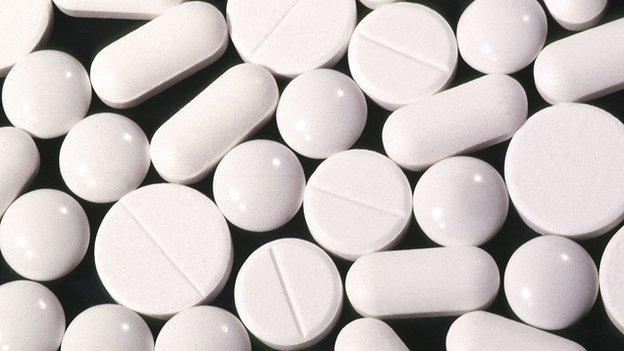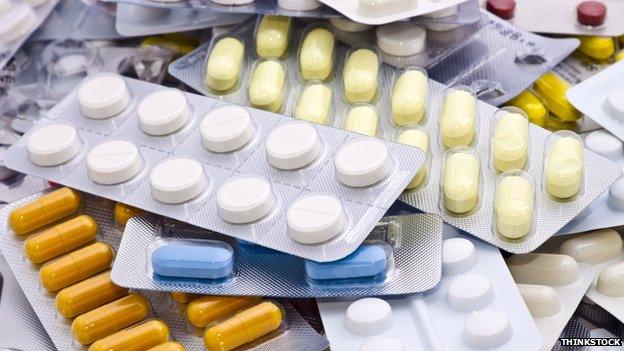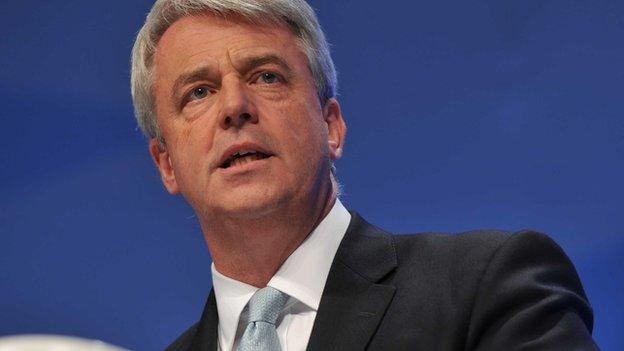The 'problem' of medical drug prices
- Published

A lot of people in the NHS hate the Cancer Drugs Fund - the pot of money dedicated to funding expensive cancer drugs for patients in England.
This is because the CDF - a fund that will have £340m next year - exists to pay for treatments that would not be bought were cancer subject to normal NHS cost-benefit rules.
Cancer patients are given more support than other patients.
This is seen as a problem for two reasons.
First, basic fairness. Why care more about cancer than other diseases? Second, it undermines the cost-benefit system that officials and doctors work hard to make work for the rest of the NHS.
There remains one big undiscussed element to this, though.
The CDF is a "stop-gap". That's what everyone says.
Andrew Lansley, the former health secretary, said the fund "is not, and was never intended to be, a permanent solution" to the problem the NHS keeps raising about cancer drugs often costing too much.
A stop-gap to what?
At the moment, the NHS has an odd system for drug pricing.
It allows "free pricing", which means that pharmaceutical companies can name their price when they come forward with a product.
Then the NHS says "yes" or "no". The state makes a call on whether that price represents good value.
That decision-making role is currently occupied by NICE - the body whose main expertise is in assessing medical technologies.
It works out how much each new technology that it assesses either improves quality of life or prolongs it.

NHS England this month revealed that 25 treatments might no longer be funded by the CDF
Nice says treatments should not cost more than £20,000 to £30,000 for each extra year of life in good health they bring. But there are exemptions.
Costs can go higher for end-of-life care, for example. But if a drug doesn't meets the criteria, we don't buy it.
This is not the only NHS cost-control mechanism: doctors have budgets to watch. And the total drug bill is capped.
If we overspend, the pharmaceutical companies pay a rebate. But NICE controls which drugs enter the main NHS bloodstream.
This process creates a political problem. Rejecting cancer drugs makes front-page news. It could make the whole NICE system politically toxic - hence why the CDF exists.
The role of the CDF is to shield NICE from campaigners.
But the argument about cancer has distracted us from other problems that the NICE system introduces.
For example, imagine NICE approves a new drug, so hospitals have to offer it. But, to pay for it, hospitals have to cut other treatments for other diseases that might be more efficient than the new product? That happens a lot.
Can we do better?
Mr Lansley wanted to change the way we say which drugs the NHS can use when he was health secretary.
Rather than have a system where the NHS just says "yes" or "no", he wanted a process where the NHS would say to the companies: "We want this drug and we will pay £2,000 for a drug of this quality."
This is hardly novel: it's how much of the world works. But changing to his idea - known as "value-based pricing" (VBP) - would also mean a lot of change for the NHS.
Some could be good.
For example, if you are willing to set prices drug-by-drug and disease-by-disease, you can incorporate a wider range of issues into your assessment of value for money.
Technical assessments made by NICE could be supplemented by other work.

Andrew Lansley, the former health secretary, said the fund was never intended to be a permanent solution
Mr Lansley wanted us to be willing to pay more for drugs that save money by reducing a patient's need for carers. So we could raise the maximum price we would be willing to pay for a given treatment for Alzheimer's, say.
We could also systematically pay more for things like mental health treatments, because we need to encourage so much research in that area.
We could do the same to encourage breakthrough research like the new post-statin cholesterol-busters.
And VBP could well lead to a pricing system that lets through a lot more cancer drugs on a more rational basis. Lots are innovative and some of their benefits are not fully captured by the current system.
'One-way ratchet'
The system would assume we would buy any drug at a price we would fix based on what it is worth to us, rather than simply saying "yes" or "no" to a price based on the pharmaceutical companies' assessments.
Still, changing this would be tough. The pharmaceutical companies do like free pricing. That's because the UK price can be used as a reference price for selling abroad.
The NHS would also need to cut prices for a lot of drugs. It can't be a one-way ratchet, where it only promises to pay more for stuff.
But there's no guarantee we could save money. There's also no guarantee we'd be good at it, or that we really would have enough pricing power to direct drug research.
A lot of health economists like the idea of VBP, but worry about implementation.
George Freeman, the responsible minister, said VBP "might involve a 10-year programme of deep and long-term change, but we are definitely committed to embracing it and to laying a policy foundation for it.", external
The argument about cancer drugs will be reignited in March.
This month, NHS England revealed that 25 treatments might no longer be funded by it. They are too expensive or ineffective even for the fund, officials say.
Those decisions will be finalised then, and patients who have been denied drugs will start coming forward soon afterwards.
When this starts again, it's fair to reflect that the CDF isn't really fair on patients of other diseases.
But we should be thinking about whether the CDF is the problem, or whether it is a drug pricing system built around just saying "yes" or "no".
- Published15 January 2015

- Published12 January 2015

- Published7 January 2015

- Published12 November 2014
